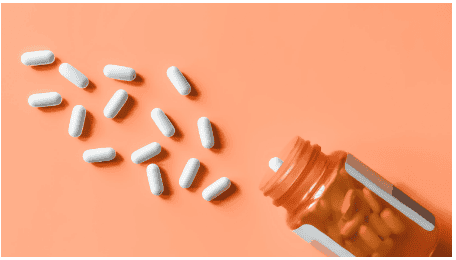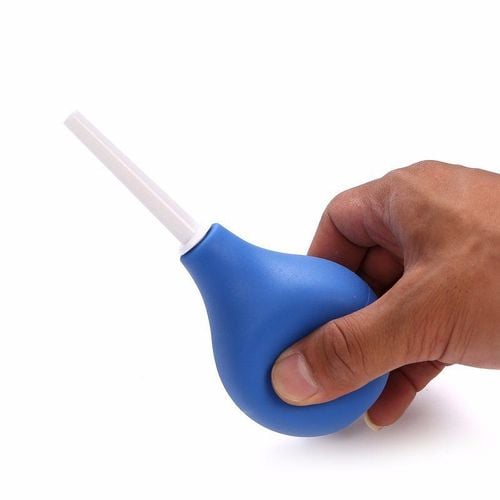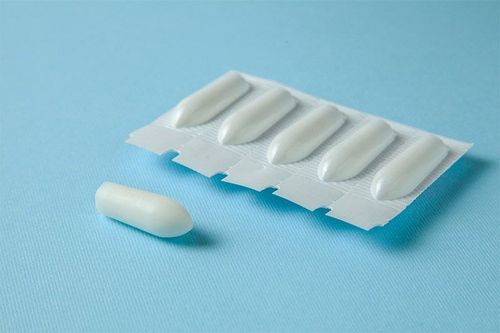This is an automatically translated article.
When a child has a fever, you often want to quickly bring the child's fever down, to help him feel more comfortable. To be able to bring down your child's fever safely, it is important that you follow the instructions carefully to ensure that your child is receiving the right medicine and dosage for him. Ibuprofen is one of the most commonly used antipyretic drugs for children.
1. Safe treatment for children with fever and pain
When your child has a fever, you often want to quickly bring down the child's fever, to help the child feel more comfortable. To be able to bring down your child's fever safely, it is important that you follow the instructions carefully to ensure that your child is receiving the right medicine and dosage for him.
Improper use of over-the-counter (OTC) medicines to reduce fever in children can cause serious, even life-threatening complications. These tips can help you avoid that.
1. 1. Read the drug information carefully before you use it
A careful reading of the information on the packaging and instructions for use of the drugs will provide you with the necessary information such as:
The active ingredients of that drug What disease it treats Dosage Dosage Give your child Drug interactions or potential side effects When to call your doctor Even if you've used the drug before, it's still a good idea to re-read this information. Because things may have changed from the last time you used it. For example:
Your child may have gotten older or gained weight, so the right dosage may vary. Your child may be taking another medicine that interacts with this medicine.
1. 2. Search for the active ingredient of the drug
The active ingredient of the drug is the most important one, it produces the therapeutic effect of the drug. You need to know what it is and how it works. The active ingredient is often different from the name of the type of drug. This means that two drugs with different names may have the same active ingredient. You must make sure that you do not give your child two medicines with the same active ingredient.
Different but similar active ingredients should not be used together unless directed by a doctor. For example, both Acetaminophen and Ibuprofen have antipyretic and analgesic effects. Knowing the ingredients of a medicine and how it works can also help you avoid giving your child two drugs that have the same effect.
Sometimes you may want to switch from one medicine to another if that medicine doesn't give you the effect you want.
1. 3. Always follow dosage instructions
Some drugs use the child's weight to calculate the dose, but the dosage of some other drugs is based on age.
For medicines that calculate the dose based on the child's age, you should talk to your child's doctor if the child is very light or very heavy for his age. That way, you can be sure you're giving the right amount of medicine to your child.
Never give a child more medicine than the recommended dose.
1.4. Use only the dosing tool that comes with the medicine.
Never use a kitchen spoon or measuring cup from another medicine to take medicine your child takes. Kitchen spoons can vary in size, just as the dosing cups of medicines can vary. Therefore, if you do not use the correct dosing tool, you will not be able to be sure that you are giving the correct dose of medicine to your child.
1.5. Know the acronyms for the unit of measure of the drug
When reading the instructions for use, make sure you can tell the difference between milligrams (mg), milliliters (mL) and ounces (oz).

Đọc kỹ hướng dẫn sử dụng trước khi cho trẻ dùng thuốc
1.6. Do not give children medicine in low light conditions
Children are often sick at night, so it's not unusual for you to be in a semi-awake state looking for medicine in the dark. However, take a minute to turn on the lights and put on your glasses (if necessary) so you can read labels and the dosing device clearly. If your child is already sick, keep the medicine close to where you and your child lie, so you can give it whenever needed.
1.7. Ask your doctor before you give your child more than one over-the-counter medicine
If your child has a cough, fever and headache, you may have to give them two medicines. But many cold and flu medicines have the same ingredients as fever reducers and pain relievers. If you give your child both, it can lead to an overdose.
Carefully reading the packaging and instructions can help you spot the same ingredients. However, you should talk to your doctor before using more than one over-the-counter medicine in children.
1.8. Treat colds without medicine
Children under 12 with a stuffy nose can use saline nasal drops or nasal sprays and cool mist humidifiers instead of over-the-counter medications. These remedies can help relieve nasal congestion, but must be used correctly.
1.9. Do not give cough and cold medicine to children under 4 years old
According to the FDA, the benefits of cough and cold medicines do not outweigh the risk of serious side effects that can come from their excessive use in children under 4 years of age.
It's best to avoid things like decongestants, antihistamines, expectorants, and cough suppressants in children under 12 years of age. But honey can be helpful to treat a nocturnal cough in babies older than a year. Always call the doctor if your infant has a cold or fever.
1.10. Do not give aspirin to children under 18 years of age to reduce fever and pain
Giving aspirin to a child can cause a rare, life-threatening condition called Reye's syndrome. Never give your child any medicine that contains aspirin unless your doctor recommends it.
1.11. Know when to call the doctor
If your child has a fever for a few days and doesn't get better or gets worse, call the doctor right away. Do not use any medicine for longer than recommended on the package or leaflet.
2. Ibuprofen for children and infants: Proper dosage and safety advice
2.1. Ibuprofen fever reducer for children
Ibuprofen is a common pain reliever and fever reducer for children. It is commonly used to treat symptoms of fever, teething, and toothache.
Ibuprofen also treats inflammation, such as soreness after an injury, sprain, or a health problem like arthritis in children. It can also be used to reduce fever.
For children 3 months to 12 years: Ibuprofen comes as a liquid syrup. For children 7 years and older: Ibuprofen is available as tablets, capsules, and powders that you can dissolve in water to take by mouth. You can buy most types of ibuprofen at drugstores. Some, such as ibuprofen powder, are available by prescription only.
2. 2. Some notes when using Ibuprofen for children
Ibuprofen comes in different strengths. Dosage for children depends on their age and sometimes their weight, so always read the instructions carefully. Your child will start to feel better about 20 to 30 minutes after taking ibuprofen. It's best to give your child Ibuprofen with or right after a meal so as not to upset the child. Do not give your child Ibuprofen on an empty stomach. Do not give Ibuprofen if your child has asthma, unless the doctor says it is okay.
2.3. Who can and who can't take ibuprofen?
Children can use Ibuprofen:
Liquid syrup for children from 3 months old. Ibuprofen tablets and capsules are for children from 7 years of age. Ibuprofen chewable tablets for children from 7 years old Ibuprofen powder form for children from 12 years old Ibuprofen is not suitable for certain children such as:
Children who have had an allergic reaction to ibuprofen or any other medicine in the past . Children with asthma Children with liver or kidney problems Children at higher risk of bleeding Children with inflammatory bowel disease, such as Crohn's disease or ulcerative colitis. Do not take ibuprofen for chickenpox unless recommended by your doctor. Because the drug can cause serious skin reactions.

Liều lượng thuốc cho trẻ phụ thuộc vào tuổi và đôi khi là cân nặng
2. 4. Ibuprofen dosage for children
Ibuprofen is usually given to children 3-4 times a day. If you're not sure how often to give your child, ask your doctor.
If you give it to a child:
3 times in 24 hours, at least 6 hours apart. 4 times in 24 hours, at least 4 hours apart. Dosage of Ibuprofen syrup for children:
| Tuổi | Liều lượng | Số lần sử dụng |
| 3 đến 5 tháng tuổi | 2,5ml | Tối đa 3 lần trong 24 giờ |
| 6 đến 11 tháng tuổi | 2,5ml | Tối đa 3 - 4 lần trong 24 giờ |
| 1 đến 3 tuổi | 5ml | Tối đa 3 lần trong 24 giờ |
| 4 đến 6 tuổi | 7,5ml | Tối đa 3 lần trong 24 giờ |
| 7 đến 9 tuổi | 10ml | Tối đa 3 lần trong 24 giờ |
| 10 đến 11 tuổi | 15ml | Tối đa 3 lần trong 24 giờ |
| 12 đến 17 tuổi | 15ml đến 20ml | Tối đa 3 - 4 lần trong 24 giờ |
Dosage of Ibuprofen tablets for children:
| Tuổi | Liều lượng | Số lần |
| 7 đến 9 tuổi | 200mg | Tối đa 3 lần trong 24 giờ |
| 10 đến 11 tuổi | 200mg đến 300mg | Tối đa 3 lần trong 24 giờ |
| 12 đến 17 tuổi | 200mg đến 400mg | Tối đa 3 lần trong 24 giờ |
If your child has a persistent fever, the doctor may prescribe a tablet or a slow-release tablet to be taken once or twice a day.
In case you forget to give your child the medicine, give the missed dose as soon as you remember. If it is almost time for the next dose, skip the missed dose and give the child the next dose as usual. Never use a double dose of Ibuprofen to make up for a missed dose.
If you mistakenly give your child a double dose of ibuprofen, wait at least 12 hours before giving your child the next dose.
2. 5. How to give your child Ibuprofen
It is best to give your child Ibuprofen with food or milk so that the child does not have an upset stomach.
With Ibuprofen Syrup, you need to shake the bottle well and measure the correct amount using the syringe or plastic spoon included in the medicine box. Do not use a teaspoon as it will not give the correct dose of medicine you need to give your child.
To overpower the taste of the syrup, you can give your child milk or juice right after instilling the medicine. But do not mix ibuprofen syrup with juice or milk because doing so may not give your child the full dose of the medicine if the juice or milk is not finished.
With Ibuprofen tablets and capsules, the child should swallow the tablet whole with a glass of water or juice. Ask your child not to chew, break, crush or suck on them as this may irritate the child's mouth or throat.
Children taking Ibuprofen chewable tablets should chew before swallowing.
With Ibuprofen powder you can sprinkle or stir the powder into a small amount of soft food (such as yogurt) or drink, or you can mix the medicine with a spoonful of cold water. Do not mix the medicine with warm food or liquids.
2. 6. Ibuprofen with other antipyretic and pain relievers
Paracetamol is the only safe pain reliever and fever reducer for children along with Ibuprofen. However, do not give your child Ibuprofen and Paracetamol at the same time. You need to give each of these medicines to your child, unless otherwise directed by your child's doctor or nurse.
Use Ibuprofen to reduce fever: If you have given your child ibuprofen and the child still has a high fever after 1 hour, you can try Paracetamol instead. If this helps lower the child's temperature, you can switch to using Paracetamol to lower the child's fever.
Call your doctor if you have tried both paracetamol and ibuprofen and your child is not getting better. Do not alternate between paracetamol and ibuprofen to treat fever without advice from your doctor or nurse. Do not give your child more than the maximum daily dose of either medicine.
Use Ibuprofen for pain: If you have given your child ibuprofen and they are still in pain 2 hours later, you can also try giving your child paracetamol. If this works, you can substitute paracetamol and ibuprofen, giving only 1 medicine at a time.
Do not give more than the maximum daily dose of either drug.
Take your child to the doctor if you have tried alternating paracetamol and ibuprofen and it does not help. Also see your doctor if you don't know what's causing your child's pain.
2. 7. Ibuprofen side effects in children
Ibuprofen can cause side effects. To reduce the risk of side effects, give your child the lowest dose for the shortest time to control his or her symptoms.
2.7.1. Common side effects of Ibuprofen
Common side effects of ibuprofen, which occur in more than 1 in 100 children, are:
Indigestion Ợ Sour Nausea or vomiting: You can reduce this by giving your child ibuprofen with food. If these symptoms continue or get worse, they could be a sign of bowel or stomach irritation. Tell your doctor if these side effects do not go away or make your child uncomfortable.
2.7.2. Serious side effects of Ibuprofen
You need to contact the doctor immediately if your child experiences one of the following serious side effects of Ibuprofen:
The child has severe stomach pain, vomits blood or the child's stool is very dark or black - here could be a sign of a stomach ulcer; The child stops urinating or has blood in the urine, which could be a problem with his or her kidneys; Children with tinnitus. Ibuprofen can make asthma worse in some children, but this is not common. Talk to your doctor if you are concerned about this.
2.7.3. Serious allergic reaction to Ibuprofen
In rare cases, a child may have a severe allergic reaction to ibuprofen. Then you need to act immediately, call 911 or get medical attention right away if:
Your child has a skin rash that may include: Itching, redness, swelling, blistering or peeling of the skin; The child is wheezing; The child has tightness in the chest or throat; The child has trouble breathing or speaking; Your child's mouth, face, lips, tongue, or throat begin to swell. If you have these symptoms, your child may have a serious allergic reaction and may need immediate hospital treatment.
2. 8. Caution when using Ibuprofen with other medicines
Ibuprofen may react with some other medicines to decrease their effectiveness or increase the risk of side effects. So tell your doctor if your child is taking any other medicines, including herbal products, vitamins or supplements.
Parents need to pay special attention to abnormal symptoms in children after using Ibuprofen, they need to notify the doctor immediately for timely treatment or take the child to the hospital for treatment, to avoid complications. More severe symptoms occur. Parents can take their children to Vinmec International General Hospital for examination and treatment.
Pediatrics department at Vinmec International General Hospital system is the address for receiving and examining diseases that infants and young children are susceptible to: viral fever, bacterial fever, otitis media, pneumonia in With modern equipment, clean and airy space, minimizing the impact as well as the risk of disease spread. Along with that is the dedication from experienced doctors who specialize in pediatric patients, making the examination no longer a concern for parents.
Please dial HOTLINE for more information or register for an appointment HERE. Download MyVinmec app to make appointments faster and to manage your bookings easily.
References: webmd.com, nhs.uk, healthlinkbc.ca













